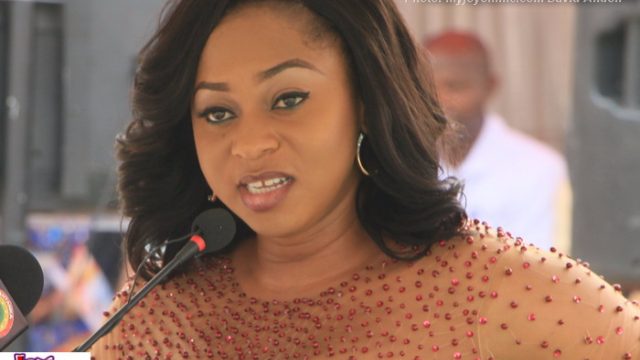Deputy Majority Leader and Chairperson of the Women Caucus of the Parliament of Ghana, Sarah Adwoa Safo, says the passage of the Affirmative Action Bill into an Act, will empower and increase women participation in decision making.
Adwoa Safo who is also the Minister of State in-Charge of Public Procurement, told participants at the Women Political Leaders (WPL) Summit 2019 in Tokyo, Japan that the ultimate goal of the proposed Affirmative Action Bill, is to bring about gender parity in the Ghanaian society.
“For instance, Clause 38 of the draft bill says that ‘A person who victimizes, obstructs or exerts undue influence and submits a female politician to verbal attack, among others, commits an offence’. Government is committed to passing this bill to bring about gender parity in the country,” she told the participants on Thursday, June 27.
Why Affirmative Action?
Ghana has a political system that encourages stereotyping of women and put men at the top.
The Affirmative Action Bill which has suffered a number of setbacks for about 10 years now, seeks to correct this and increase the participation of women in decision making.
It provides for a 40 percent representation and participation of women in governance, public positions of power and decision making.
The Bill is currently before the Parliament for consideration.
The Member of Parliament (MP) for Dome-Kwabenya constituency expressed the belief that the Bill when passed into an Act, will change the status quo.
Ghana’s poor ranking
Ghana is currently ranked 145 out of 193 in the Inter-Parliamentary Union ranking on Women representation in Parliament across the world.
Despite the country’s impressive democratic credentials, evidence from the previous elections indicates that the participation of women is very low. Out of 275 Members in the Parliament of Ghana, only 38 are women, representing a marginal 13.8 percent of the total number of Members of Parliament.
However, in the view of Adwoa Safo, Ghana has made marginal progress in the 2016 election by increasing the number of elected women from 30 (10.9%) in 2012 to 38 (13.8 percent), which still falls short of half of the 30 percent threshold mark set by the United Nations.
She, therefore, proposed that should there be the need to create new constituencies by the Electoral Commission (EC) of Ghana, all the political parties should agree to preserve constituencies for women.
This she believes will help bridge the gap for women representation in Parliament.
Efforts so far
She also told the Summit some measures successive governments have put in place to increase women participation in decision making and as well elaborated on the achievements of women in political and private sector leadership in Ghana.
For instance, she said the government led by Nana Addo Dankwa Akufo-Addo has nine women out of his nineteen Cabinet Ministers, representing 27 percent, but stressed that the number as promised by the governing New Patriotic Party (NPP) “can still be better”.
That notwithstanding, in 2009, then President, John Evans Atta-Mills of blessed memory appointed the first female Speaker of the Parliament of Ghana, Joyce Adeline Bamford-Addo.
In the private sector, Adwoa Safo mentioned names such Yolanda Zoleka Cuba, CEO of Vodafone Ghana, Yvette Adounvo Atekpe, Regional MD, IS Internet Solutions among others whose achievements are worth emulating.
The MP was accompanied by Comfort Doyoe, Vice-Chair of the Women Caucus in Parliament and MP for Ada East constituency and Gifty Twum Ampofo, Deputy Minister for Education and MP for Abuakwa North Constituency.
Adwoa Safo took turns to interact with the Vice-President of Liberia, Howard Taylor, Vice President of the Senate of Italy, Paola Jeverna and Japan’s Health, Labour and Welfare Minister, Takumi Nemoto (only female Minister out of the 20 Ministers in Japan).
About Women Political Leaders
The WPL, which is the first to be held in Asia started on Wednesday, June 26, 2019. About 400 participants, mostly female political leaders, from 87 countries gathered to discuss this year’s theme – “Taking action to advance society toward the UN’s Sustainable Development Goals”.
Japan’s Prime Minister, Shinzo Abe, who opened the Summit via a pre-recorded video, renewed his commitment to empower women and improve gender parity around the globe.
He told participants that he will ask G20 leaders to commit to providing an additional 4 million young women with at least 12 years of high-quality education by 2020, and reducing the workforce participation gap between men and women by 25 percent by 2025.
WPL President, Silvana Koch-Mehrin on her part, reiterated the importance of women’s rights in relation to achieving the SDGs.


